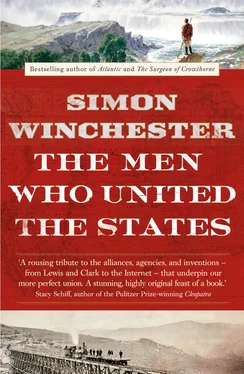1 ...7 8 9 11 12 13 ...26 One could imagine that Clark would have rather liked to stay, but just after lunch the next afternoon, they set off—“under three Cheers,” wrote Clark, “from the gentlemen on the bank.”
They headed first directly toward the west, toiling against a slow river current and the whirling of the deadly water-boils they would endure for the next fifteen months, and until they eventually crossed the unknown, unimagined wilderness of the Continental Divide after more than three thousand miles of travel.
They spent the first six weeks journeying easily enough through what is now the state of Missouri. During the early miles, a number of limestone cliffs and sandstone bluffs rise up beside the stream—indeed, Clark fell from one three-hundred-foot pinnacle early in the trip, saving himself only by digging his knife into a crevice and dangling there until he felt brave enough to clamber back up. But generally the countryside here is more floodplain than valley, more prairie than canyon, and the river winds and wanders irrationally, all over the place.
The party found they were making only minimal forward progress, even though their daily distances turned out to be wearyingly long. Today the highways and the Union Pacific rail lines follow much the same exhausting path along the riverbank. They do so not because contour lines compel them to, but because if they tried to go straight where the river winds—with every single bend given a name, Bushwhacker Bend, Bootlegger Bend, Cranberry Bend—far too many costly bridges would be required. It is more prudent and economical to follow the stream than to fight it, today just as it was back in the expedition’s time.
THE FRONTIER AND THE THESIS
After some weeks of sailing and rowing and poling along a willow-banked river, the party reached a junction, with a river they called the Kaw, today the Kansas River. The leaders were at last quite impressed with the landscape—“the countrey about the mouth of this river is verry fine,” wrote Clark, and said it would be a good site for a future army fort.
The army must not have agreed, but civilian settlers eventually did, in their thousands, for they later turned the spit of land between the two streams into an enormous campsite, a base for the long and heroic westward treks along the Oregon Trail, the Santa Fe Trail, and the California Trail. And the metropolis that some of their number then stayed behind to build, Kansas City, has become a classic of frontier America.
I had been here before, some thirty years earlier. It was shortly before the bicentennial celebration of 1976, when I spent six months traveling through the Midwest, trying to understand the importance of that uniquely American phenomenon, the frontier. Along the way I had met many people and had seen many things: two of the more memorable happened to be right here, where Lewis and Clark were pressing westward through the very frontier I was studying.
The first encounter was of rather lesser importance, though it still had some poignancy. I had been invited to visit a marble memorial to an enormous white Charolais bull. He was named Sam 951, and until 1972 he had lived on a ranch in the town of Chillicothe and had been famous for miles around as an example of bovine excellence. Sam’s frozen semen, once produced in exuberant gallons by what all agreed was an excessively jolly creature, was worth millions, and was packaged in nitrogen-cooled vials to be sent off from Chillicothe to eager customers all over the world.
The Litton Charolais Ranch was in consequence once perhaps the most profitable cattle-breeding outfit in America. Sam 951 was primus inter pares of the large and carefully managed herd. Each bull—the best of them lived in air-conditioned barns kitted out with red carpets—weighed a ton or more, had ears the size of dinner plates, had a vast muscular body joined necklessly to an appropriately immense head, and sported dewlaps that would take two strong hands to move.
Cattle like Sam had made a great fortune for the ranch owner, Jerry Litton, and had now brought him within a hair’s breadth of true fame. I spent two happy summer days with him—a handsome and engaging man who had married a former Miss Chillicothe (and a runner-up in the Miss Missouri pageant) and who for the previous four years had been a member of the US Congress, a Democrat. His home at the time I stayed was abuzz with political excitement: in two weeks voters were due to decide whether or not to elect him a US senator. Many, indeed, thought he would and should run for national office—President Jimmy Carter was a supporter—and in early 1976 he was sufficiently intrigued to announce that he would indeed take this obvious next step along the political glide path.
When I turned up, his work was nearly all wrapped up. He was in the closing stages of what all agreed had been an impeccably nuanced and well-funded campaign for the primary election. And two weeks after I left, he did indeed triumph, leading a stunning upset in a twelve-man primary race. Jerry Litton was on the verge, I have long since believed, of well-deserved political greatness.
On the night of his victory, he was to be flown back to Kansas City for a celebration. But then came calamity. The crankshaft in one of the engines sheared in half; the little plane lost power and crashed on takeoff; and Litton, his wife and children, his Beech Baron’s pilot, and the pilot’s son were all killed. Jerry Litton had been born in a house without electric power, in 1937, when this part of Missouri still had the feel of the frontier about it. He would have brought something of this spirit to Washington had fate permitted it. He was a figure of whom it can rightly be said, He could have been a contender. But fate saw to it that he never got the chance.
My second excursion of that 1976 adventure concerned the polar opposite of a cattle farm. I spent time touring a sprawling Minuteman nuclear missile site, centered at the Whiteman US Air Force Base, an immense complex of men and their flying machines set close by a village just south of the river with the engaging name of Knob Noster. Back in the 1970s, it was quite possible to visit the immense missiles and to descend deep into the bunkers where clean-cut young officers—curiously decked out in uniforms that included starched white ascot collars—sat beside their pairs of launch switches, enduring a bleak shift of existence in air-conditioned subterranean silence, waiting to execute a world-destroying command that, mercifully, never came.
The Cold War is now over, but America still has deployed around the country three wings of Minuteman missiles, all nuclear tipped and more powerful than ever, as ready to go as ever they were before. They are, however, no longer deployed in Missouri but in more distant and protected wilderness bases in North Dakota, Wyoming, and Montana. One can still try walking across lonely Montana meadows up to the edge of the wire-protected silo where a missile lurks beneath its concrete blast doors, to test how long it takes before a security jeep or a helicopter, with flashing blue lights and a crew of soldiers with full authority to maim, comes to find out what you are up to. Back in Missouri in the 1970s, I was invited to try and found it took no more than a couple of minutes for my breach of security to be discovered and repulsed. But it is no longer possible to play such a game at the Whiteman Base there since the men have all been stood down and their missiles dismantled and destroyed under the terms of the various treaties signed with a Russia that is no longer the Soviet Union, no longer seen as quite the threat it once was.
Yet Whiteman Air Force Base itself still exists, and if not armed with missiles today, it still sports a title and wields an ability that sends chills down spines. It is part of a terrifying arsenal of weaponry that is now called—after numerous organizational changes and semantic alterations of title—the United States Air Force Global Strike Command.
Читать дальше












